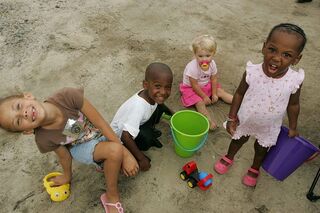Polyamory
Should You Come Out to Your Kids if You Are Polyamorous?
Three things to consider when thinking about coming out to kids as polyamorous.
Posted November 15, 2021 Reviewed by Davia Sills
Key points
- Parents in polyamorous relationships often face challenging decisions about coming out to their children—or not.
- Young children do not need to know the intricacies of their parents' relationships, but older kids need honest and age-appropriate information.
- When partners play a big role in kids' lives, parents are more likely to come out than if their partners are far away or rarely around.
- Vulnerability to getting fired or losing custody of their kids influences some parents' decisions to come out.
Coming out to children as a sex or gender minority has long been a complex issue for parents in LGBTQ+ relationships and is becoming increasingly important for parents in polyamorous and other consensually nonmonogamous (CNM) relationships. As a general rule, parents in polyamorous relationships respond to their children's questions with honest and age-appropriate answers—and that holds true for coming out as well. This first part of a series of blogs on talking to children about polyamory begins by considering when parents might want to come out to their kids and when they might not.
Should you come out as polyamorous to your children?
When parents in polyamorous relationships consider if they should come out to their kids or not, the answer depends on a wide range of factors. Some of the most important elements in this decision are the age of the child, the degree of exposure the child will have to parents' partners, and the level of threat that information could pose to the family's well-being.
Age of child
In general, less is more when telling kids about adult relationships. The older the child is, the more information they will require, and the more likely they are to have developed the intellectual ability to understand.

Unless the kids ask about it, parents do not need to tell their small children that the adults are in a polyamorous relationship. Babies and toddlers have no idea how the complexities of adult relationships work and generally take their family form for granted. Preschoolers in polyamorous families do not usually question why there are multiple adults in their lives; it is simply normal for them.
By elementary school, children generally develop some understanding of how their families compare to others' families. Kids between 5 and 10 years old may have some questions about their family structure and the ability to understand at least some of what is happening among adults. Prior to adolescence, children might be comfortable with a basic understanding of "kissing or non-kissing" relationships between their parent(s) and others.
Once they get to adolescence, children begin to develop a more complex understanding of sexuality and adult interactions. Adolescent kids from polyamorous families will need more information from their parents about all sorts of things—including what is happening among the adults in the family. Kids in middle school and especially high school develop much more sophisticated understandings of the adults around them and how their families fit into the larger society. For polyamorous parents, coming out to older children makes more sense, both because they might be noticing interactions among the adults and could wonder what is happening and because they are better able to discern when to disclose information about the polyamorous nature of their family and when to keep that information private.
Exposure to partners
Another thing to consider when thinking about coming out to kids as polyamorous is the degree of contact those kids will have with parents' partners. How relevant will the partners be to the children's daily lives? For a family with a long-distance partner who sees the kids every other year, it might not be a priority to clarify who this person is and how they are related to the parents. A polycule that has partners who are around weekly or daily will most likely want to offer the children information about the consensual nature of their relationships sooner than later—again, especially if the kids ask.
Level of threat
How important is it that the child keep the polyamorous family status secret? What level of danger does the family face if they are outed as polyamorous? How many other social disadvantages are already weighing you down (racism, homophobia, ableism, etc.), and can you afford to potentially take on another one voluntarily?
Making young children keep secrets is not only quite risky but also damaging to their emotional well-being. If you are in a vulnerable position already and a slip of your child's tongue might have devastating impacts, it might be best to avoid putting the child in the position of having to keep the poly family a secret. For instance, if someone might be fired for being in a CNM relationship, then it is best to avoid disclosing that fact to young children who might interact with coworkers. For polyamorous parents who are self-employed or have jobs with no morality clause, the risk is much lower, and they might feel more comfortable telling their children.

In addition to possible job loss, polyamorous parents should consider extended family members who may pose a threat to the custody of their children. In my research and experience as an expert witness, threats to custody tend to come from two primary sources. The first is an ex-spouse who is not polyamorous. This can be an especially dangerous situation when the children are young, and the relationship between the parents ended because of infidelity or a poly/mono mismatch. Second, grandparents can sometimes sue for custody of their grandchildren from CNM families, especially if the grandparent is wealthy and religious.
Very few polyamorous families seem to have their children removed by Child Protective Services (CPS), and then almost exclusively because something else drew the authorities' attention. When polyamorous parents face possibly getting fired or losing custody of their children, they should be very careful and selective about coming out as polyamorous. In that case, it might be better to hold off telling the kids for as long as possible, especially with young children.
Ultimately, parents with kids old enough to understand, partners who are integrated into family life, and a low risk of losing their jobs or custody of their kids are fairly safe to come out. That is especially true for polyamorous folks who live in liberal areas with diverse populations. For those families who have small children, distant partners, and/or face significant risks if the children accidentally out them as polyamorous, coming out may be too high-risk with too little relevance to the kids' daily lives, and thus a terrible idea.
References
Sheff, E. (2013). The polyamorists next door: Inside multiple-partner relationships and families. Rowman & Littlefield.
Sheff, E., & Wolf, T. (2015). Stories from the polycule: Real life in polyamorous families. Thorntree Press LLC.




